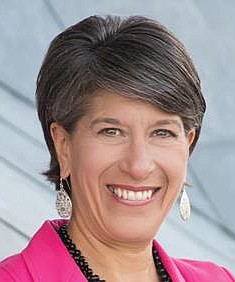A few years ago, my mom attended the Wednesday night program at her church. Afterward, she called me and shared the speaker's topic: "Your Kids Don't Want Your Stuff." Then she asked me the dreaded question: "You really don't want all these treasures I have accumulated through the years?"
While I appreciate the sentimental significance of some of her things, I honestly appreciated the speaker's point. This is just one of the complicated moments the second half of life often brings.
Our daughter surprised us with a visit a few days ago, and as we were talking with friends, someone commented to her, "I can't believe you're 25!" She responded,"I know, I realize I'm halfway to 50!"
It occurred to me that if she's halfway to 50, I'm halfway to 114. Whoa. This second half of life does have a way of sneaking up on us. Growing old is hard, especially when you still feel young and vibrant, but your body is screaming, "Not!"
Recently, my mom shared that her best friend was really struggling with giving up driving. She was trying to help her understand that it really was a loving gesture from her kids. I couldn't help but wonder what it will be like when I have to have that same conversation with her or our daughter has to make that decision for one of us.
Plenty of us are independent folks, and the idea of losing that independence is really scary. In fact, many of us are unwilling to think about it, much less have some of the difficult conversations we need to have with our loved ones. When it comes to living life well to the end, what will your legacy be where relationships are concerned?
Many of us can look in the rear-view mirror and think about situations or relationships we wish we had handled differently, perhaps with our children, our own parents or a close friend. Sometimes we believe it's too late to do anything about it. If you're reading this, you still have time.
While working on my master's degree in counseling, I completed an internship on one of the cancer floors at the University of Tennessee at Knoxville Medical Center. I will never forget the many times I walked into a room where the patient was literally ready to die but held on because there was unfinished business with the people standing around the bedside.
Do you have unfinished business to take care of with the people who mean the most to you? It is abundantly clear that people take their relationship with their parents to the grave with them. And I can tell you based on research, a parent's words and actions matter.
I recently heard a very successful man share that his parents have never told him they love him, and he became very emotional. There was this big, burly, manly-man in his 60s who still longs/wants/needs/wishes to hear his parents say, "I love you."
What is your relationship like with your children? Do they know you love them and believe in them? If that's a hard place for you, remember that you can't control their response, but you can control what you do.
When our daughter was growing up, I used to tell her that I loved her but I didn't like her behavior. Over time I transitioned to telling her there is nothing she can do to make me love her more or less. That doesn't mean I will agree with all of her decisions, but I want her to know I believe in her and I love her, period. If I unexpectedly die in my sleep, I don't want her to wonder how I feel about her.
We are all going to die.
A young man in his 30s with a brain tumor was talking with his father after a medical appointment, and he reminded his dad that our life on this Earth is "terminal." There is some serious wisdom. A lot of us hate talking about dying, yet it's inevitable. So here's another question: How do you want to live until you die? That's a huge part of your legacy, and you are teaching those around you.
There is no super-secret formula for this. We are all different. Whether it's driving, turning over the reins of the company, moving out of the house you have lived in forever or getting rid of your stuff, what do you want to pass on to the next generation?
If you don't already have a plan, there's no time like the present to create one and share it with your loved ones. Make sure there are no surprises, because it's often the surprises after someone is gone that create huge rifts in families. Talking about it might be hard, but it's healthy. It really is important for us to model, even for adult children, how to live and die well.
Finally, perhaps life hasn't gone as you planned it and anger and bitterness have taken up residence in your heart and mind. Instead of talking about it, perhaps you behave badly and take it out on the ones you love the most. Growing old sometimes stinks, but there are lots of shifts and decisions to make and things to talk about. Seeking help in this area isn't a sign of weakness; it's a sign of strength and health.
Moving forward, how will you go about creating a meaningful life with your family and friends?
Julie Baumgardner is president and CEO of family advocacy nonprofit First Things First. Email her at julieb@firstthings.org.
